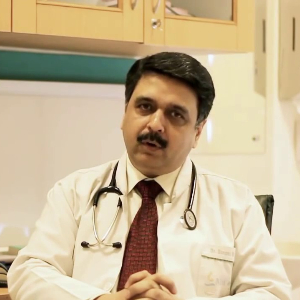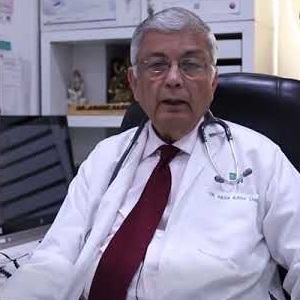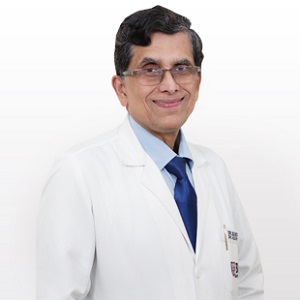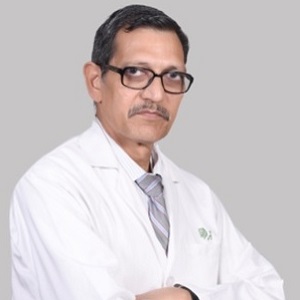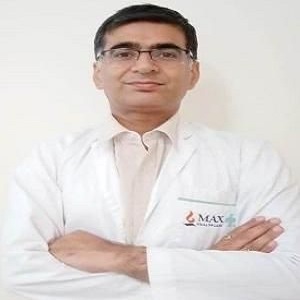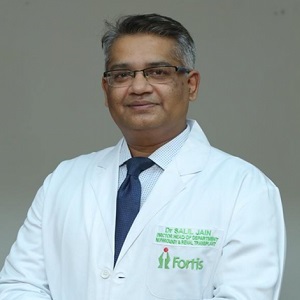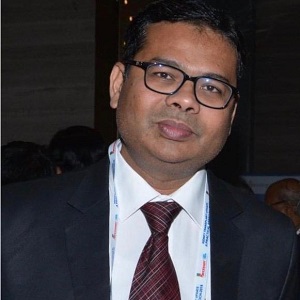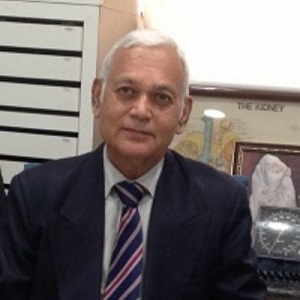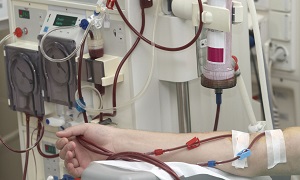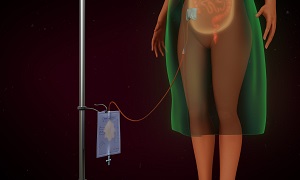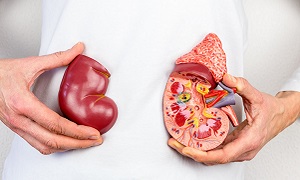Best Doctors in India for Chronic Kidney Disease Treatment
- Top Nephrologist | Max Hospital, Saket, New Delhi, India
- 25+ Years Experience
- Max Super Specialty Hospital, Saket, New Delhi
Profile Highlights:
- Dr. Dinesh Khullar is a distinguished nephrologist and kidney transplant specialist who serves as the Chairman of the Department of Nephrology and Renal Transplant Medicine at Max Super Speciality Hospital, Saket, New Delhi.
- With over 25 years of experience in the field, Dr. Khullar is renowned for his expertise and contributions to kidney transplantation and dialysis.
- Dr. Khullar has an impressive track record with more than 5,000 successful kidney transplants, including over 1,200 performed at Max Hospital, Saket.
- He has tackled some of the most challenging cases in the field, including ABO-incompatible transplants and procedures for highly sensitized and high-risk recipients with significant co-morbidities.
- Notably, Dr. Khullar pioneered the establishment of an online hemodiafiltration unit in North India, introducing advanced dialysis technology to the region.
- Nephrologist, Gurugram, India
- Over 15 years’ experience
- Medanta-The Medicity, Gurgaon
Profile Highlights:
- Dr. Manish Jain is a leading Nephrologist and Renal Transplant Specialist in Delhi NCR, known for his exceptional work in the field of renal medicine.
- With a career spanning over two decades, Dr. Jain has made significant contributions to nephrology, renal transplantation, and dialysis.
- His dedication to the field has earned him prestigious awards, including the Fellow of Indian College of Physicians (FICP) and Fellow of Indian Society of Nephrology (FISN), in recognition of his outstanding contributions to nephrology and community service.
- Top Nephrologist Apollo Hospital, New Delhi, India
- 45+ Years Experience
- Indraprastha Apollo Hospital, New Delhi
Profile Highlights:
- Dr. Ashok Sarin is a renowned specialist in kidney diseases, dialysis, and transplantation, currently serving as a Senior Consultant in Nephrology at Indraprastha Apollo Hospital in Sarita Vihar, New Delhi.
- With over 40 years of experience at Apollo Hospital, Dr. Sarin has established himself as a leading figure in the field of nephrology.
- Dr. Ashok Sarin is renowned for his expertise in treating a wide range of kidney conditions, including kidney stones, nephrotic syndrome, polycystic kidney disease, and acute renal failure.
- As a skilled nephrologist, he excels in managing chronic kidney disease, providing comprehensive care that includes pre- and post-dialysis support, renal diet counseling, and the management of resistant hypertension.
- Nephrologist, Gurugram, India
- Over 18 years’ experience
- Medanta-The Medicity, Gurgaon
Profile Highlights:
- Dr. Sidharth Kumar Sethi is a distinguished Senior Consultant in Pediatric Nephrology and Pediatric Renal Transplant Medicine at Medanta The Medicity, Gurugram, India.
- He holds a robust educational background with an M.B.B.S., M.D. in Pediatrics, and specialized Fellowships from the International Society of Nephrology and the International Pediatric Nephrology Association.
- Dr. Sethi’s clinical expertise spans a broad spectrum of renal care, including acute kidney injury, dialysis, and pediatric renal transplantation
- Top Nephrologist | BLK Hospital, New Delhi, India
- 38+ Years Experience
- BLK Super Specialty Hospital, New Delhi
Profile Highlights:
- Currently serving as the Principal Director and Head of the Nephrology Department at BLK-Max Super Speciality Hospital in Delhi, Dr. Prakash has built a reputation for his expertise in managing acute and complex nephrological disorders.
- With over 38 years of experience in nephrology and renal transplantation, Dr. Sunil Prakash is a leading expert in the field.
- Dr. Prakash’s academic credentials are exemplary, holding an M.B.B.S., M.D. (Indian Medicine), D.M. (Nephrology), and fellowships from prestigious institutions in the USA, including FISPD and F.I.S.N.
- Top Nephrologist | Apollo Hospital, New Delhi, India
- 27+ Years Experience
- Indraprastha Apollo Hospital, New Delhi
Profile Highlights:
- Dr. D. K. Agarwal is a distinguished Nephrologist with over 27 years of experience in the field of Nephrology, specializing in Renal Transplantation, Hemodialysis, Continuous Ambulatory Peritoneal Dialysis (CAPD), and the management of complex kidney diseases.
- He is currently affiliated with Apollo Hospitals Indraprastha in New Delhi, where he has earned a reputation for his expertise in managing a wide range of kidney-related conditions.
- Dr. Agarwal has held senior consultant positions at prestigious institutions, both nationally and internationally, including Nizam’s Institute of Medical Sciences, Hyderabad, and Sanjay Gandhi Post Graduate Institute of Medical Sciences, Lucknow.
- Top Nephrologist | Max Hospital, Saket, New Delhi, India
- 20+ Years Experience
- Max Super Specialty Hospital, Saket, New Delhi
Profile Highlights:
- Dr. Rahul Grover is a leading nephrologist with over 14 years of experience in the field of nephrology and kidney transplantation.
- Currently, he serves as the Associate Director of Nephrology at Max Healthcare, where he is recognized for his expertise in treating complex renal conditions.
- His special interests include kidney transplantation, particularly in complex cases such as sensitized and ABO-incompatible transplants. Dr. Grover is also skilled in hemodialysis and Continuous Ambulatory Peritoneal Dialysis (CAPD), as well as critical care nephrology.
- Nephrologist, Gurugram, India
- Over 24 years’ experience
- Fortis Memorial Research Institute
Profile Highlights:
- Dr. Salil Jain, MBBS, MD, DNB (Nephrology), is a highly esteemed Senior Director and Head of the Department of Nephrology & Renal Transplant at Fortis Hospital, Gurgaon.
- With over 24 years of experience, Dr. Jain is recognized as one of the leading nephrologists in the Delhi and Gurgaon regions.
- His expertise spans across nephrology and organ transplant, with a special focus on kidney transplants.
- Nephrologist, Gurugram, India
- Over 20 years’ experience
- Medanta-The Medicity, Gurgaon
Profile Highlights:
- Dr. Shyam Bihari Bansal is the Senior Director and Head of the Department of Nephrology at Medanta Gurugram, where he also leads the Kidney Transplant and Renal Care programs.
- He holds an impressive array of qualifications, including an F.R.C.P., D.M. in Nephrology, M.D. in General Medicine, and an M.B.B.S.
- Dr. Bansal has a distinguished career marked by significant contributions to the field of nephrology and kidney transplantation.
- Top Nephrologist | Apollo Hospital, New Delhi, India
- 35+ Years Experience
- Indraprastha Apollo Hospital, New Delhi
Profile Highlights:
- Dr. Colonel Akhil Mishra is currently working as Sr. Consultant, Nephrology at Indraprastha Apollo Hospital, New Delhi. He is known for establishing the Department of Nephrology and Transplant at Apollo Hospital in 1995. He has more than 35 years of experience in this field.
- Prior to this he was working in the Army Medical Corps for 28 years (1965-1993), where he held the position of Senior Advisor in Medicine and Nephrology.
- Dr. Akhil Mishra is also known for conducting the First Kidney Transplant of the Indian Armed Forces at Army Hospital, Delhi in 1991.
- Dr. Mishra took pre mature retirement at the rank of Colonel in the year 1993. Subsequently, he established the Department of Nephrology in Escorts Research & Referral Hospital.
- He had been awarded the Vishisht Seva Medal by the President of India in 1980. He started the first kidney transplant in Army and Apollo Hospital, Delhi.
- Throughout his career, Dr. Akhil Mishra has been awarded Star Performer Consultant three times, at Indraprastha Apollo Hospital, Jan 2013, Sept 2014 & Jan 2015.
- Dr. Mishra has also been honored in 2013, by His Holiness the Dalai Lama for his dedicated work in the field of Kidney transplantation.
- He was also felicitated by the Indian Society of Nephrology (North Zone) with the Life Time achievement Award in Nephrology on 23rd Jan.2015 for his huge contribution to the growth of Nephrology.
Best Hospitals in India for Chronic Kidney Disease Treatment
- City: Gurugram, India
Hospital Highlights:
- One of India’s best and largest multi-specialty hospitals, Medanta was built with the aim to bring India to the highest standards of medical care. The hospital has been providing the best medical services to its patients, since its inception, with care, commitment, and compassion.
- Equipped with 1250 beds, the hospital was founded by Dr. Naresh Trehan in the year 2009 with an aim to provide the best medical care at affordable costs. The hospital is spread across 43 acres and includes 45 operation theatres and 350 beds dedicated solely to ICU. The hospital includes over 800 doctors, and more than 22 specialty departments and has a dedicated floor for individual specialty in order to offer the best services under one roof.
- The hospital is considered one of the premier institutes in India for Cardiac Care and includes staffs and members of high caliber. The hospital has 6 distinct centers of excellence.
- City: Gurugram, India
Hospital Highlights:
- Artemis Hospital, established in 2007 in Gurugram, India, is a leading multi-specialty institution known for its excellence in patient care and advanced medical technology, offering comprehensive services across specialties like Cardiology, Oncology, Neurology, Orthopedics etc.
- Renowned for its patient-focused care, Artemis Hospital combines state-of-the-art infrastructure with a team of internationally trained doctors and surgeons, ensuring the highest standards of medical treatment.
- Accredited by JCI and NABH, Artemis Hospital meets global healthcare quality and safety standards, reflecting its commitment to providing compassionate, personalized care.
- The hospital is recognized for utilizing cutting-edge diagnostic and ther*peutic techniques, ensuring patients receive accurate diagnoses and effective treatments tailored to their needs.
- City: Chennai, India
Hospital Highlights:
- The Apollo Proton Cancer Centre in Chennai is the most sought-after private cancer hospital in India. It is an integrated facility that provides cutting-edge, all inclusive cancer treatment to patients all over the globe.
- The hospital is a part of the renowned Apollo Group which has a large network of over 74 hospitals in India and across the globe. Out of the 74 hospitals, 21 of them are cancer centres. However, Apollo Proton Cancer Centre is the only cancer hospital to have JCI accreditation.
- The Centre, which was established on the principles of excellence and expertise, unites a formidable medical staff led by some of the most illustrious figures in cancer treatment.
- The hospital follows the global ASTRO Model Policy. It is the same global policy which is followed by countries like USA, UK, and Europe.
- Apollo Proton Cancer Centre is among the very few hospitals in India to receive patients from First World countries such as USA, Canada, New Zealand, Australia, Singapore, Thailand, etc.
- Apart from that, it is also the first hospital in Chennai to receive patients from several countries like Uzbekistan, Kazakhstan, Turkmenistan, Georgia, Armenia, Azerbaijan, SAARC countries (Bangladesh, Nepal, Sri Lanka, Maldives, Bhutan, Afghanistan, and Pakistan), South Africa, Turkey, Egypt, etc.
- In fact, there is a dedicated team at the Apollo Proton Cancer Centre that serves only international patients. Thus, on a monthly basis, the Centre receives patients from across 32 countries.
- Moreover, there are certain treatments in Apollo Proton Cancer Centre that are not available in any other centre. APCC addresses all types of possible cancers that are usually not covered by any other centre.
- City: New Delhi, India
Hospital Highlights:
- Over the last 33 years, the Fortis Escorts Heart Institute has set new standards in cardiac treatment with groundbreaking research. It is now known around the world as a centre of expertise for Cardiac Bypass Surgery, Interventional Cardiology, Non-invasive Cardiology, Paediatric Cardiology, and Paediatric Cardiac Surgery.
- The hospital has cutting-edge laboratories that perform a wide range of diagnostic tests in Nuclear Medicine, Radiology, Biochemistry, Haematology, Transfusion Medicine, and Microbiology.
- Fortis Escorts Heart Institute boasts a diverse group of bright and experienced doctors who are backed up by a team of highly qualified, experienced, and devoted support professionals as well as cutting-edge equipment such as the recently installed Dual CT Scan.
- Approximately 200 cardiac doctors and 1600 personnel currently collaborate to manage over 14,500 admissions and 7,200 emergency situations each year. The hospital now has a 310-bed infrastructure, as well as five cath labs and a slew of other world-class amenities.
- City: Gurugram, India
Hospital Highlights:
- Fortis Memorial Research Institute (FMRI) is a premier multi-super-specialty, quaternary care hospital, known for its exceptional international faculty, top-tier clinicians, super-sub-specialists, and specialized nurses, all supported by cutting-edge technology.
- It is the flaship hospital of Fortis Healthcare Limited, part of IHH Healthcare Berhad, a leading integrated healthcare services provider in India. As one of the country’s largest healthcare organizations, Fortis operates 28 healthcare facilities with over 4,500 operational beds (including O&M facilities) and more than 400 diagnostic centers (including joint ventures).
- Recognized as one of the top hospitals in India, FMRI serves as a leading referral center and aspires to be the ‘Mecca of Healthcare’ for India and beyond. Its 11-acre campus is a testament to its commitment to providing world-class healthcare.
- Accredited by JCI and NABH, FMRI is dedicated to maintaining the highest standards of healthcare quality and safety, ensuring that every patient receives the best possible care. The hospital’s reputation is further enhanced by its state-of-the-art facilities and innovative medical practices.
- City: New Delhi, India
Hospital Highlights:
- The Indian Spinal Injuries Center (ISIC), provides state-of-the-art facilities for the management of all types of spinal ailments.
- Staffed with internationally trained, acclaimed, and dedicated spine surgeons, the hospital provides cutting-edge medical & surgical technology. The hospital provides comprehensive management of spinal injury, back pain, spinal deformities, tumors, osteoporosis, etc.
- The hospital performs motion-preserving spine surgeries including disc replacement and dynamic fixation, and minimally invasive spine surgeries such as endoscopic disc excision.
- The orthopedic service of the hospital covers all orthopedic ailments including trauma, joint diseases & replacements, oncology, pediatric orthopedics & upper limb ailment.
- City: Faridabad
Hospital Highlights:
In the sprawling city of Faridabad, where healthcare needs are diverse and ever-evolving, one institution has consistently stood out as a beacon of excellence in the field of medicine—Marengo Asia Hospital. Established with a vision to provide world-class healthcare services to the community it serves, Marengo Asia Hospital has emerged as a trusted name synonymous with quality, compassion, and innovation in healthcare.
- City: New Delhi, India
Hospital Highlights:
- Indraprastha Apollo Hospital is a 700-bedded multispecialty hospital in the heart of the capital of India. It is a part of Apollo Hospital group, one of India’s most reputed healthcare chains. Indraprastha Apollo Hospital has been accredited by Joint Commission International, making it the first internationally accredited hospital in the country in 2005.
- There are 52 specialties in the hospital with one of the best cardiology centers in the country. The hospital is also equipped with State of the art infrastructure facilities with the largest Sleep Lab in Asia and the largest number of ICU bed facilities in India.
- The latest and highly advanced technologies that are installed in the hospital include Da Vinci Robotic Surgery System, PET-MR, PET-CT, Cobalt-based HDR, Brain Lab Navigation System, Tilting MRI, Portable CT scanner, 3 Tesla MRI, 128 Slice CT scanner, DSA Lab, Endosonography, Hyperbaric Chamber and Fibro scan.
- City: New Delhi, India
Hospital Highlights:
- One of the well-regarded providers in India committed to the highest standards of clinical excellence and patient care, Max Super Specialty Hospital is a part of Max Healthcare, which is the second-largest healthcare chain in India. Regarded as one of the most well-regarded healthcare providers in the country, Max Super Specialty Hospital is committed to the highest standards of clinical excellence as well as patient care. The hospital is also equipped with the latest technology as well as cutting-edge research. The hospital is known to deliver and ensure the highest level of patient care.
- The hospital has more than 500 beds and offers treatment for over 35 specialties. The hospital also holds the credit of having installed the first Brain Suite in Asia. This is a highly advanced Neurosurgical machine that allows MRI to be taken while surgery is ongoing.
- Other advanced and latest technologies are also installed in the hospital such as the 1.5 Tesla MRI machine, 64 Slice CT Angiography, 4D ECHO, LINAC, and 3.5T MRI machine.
- City: Kolkata, India
Hospital Highlights:
- Founded in 2017, the HCG EKO Cancer Centre is a committed, all-inclusive cancer care facility in Kolkata.
- The hospital was collaboratively established by India’s leading cancer care provider HCG (HealthCare Global Enterprises Ltd.), and EKO Diagnostic Pvt. Ltd., a top diagnostic and imaging chain in Eastern India.
- With 88 beds, the hospital provides a full spectrum of services including diagnosis, prevention, screening, second opinions, treatment, rehabilitation, follow-up, and palliative care.
- Additionally, the hospital contains a day-care chemotherapy ward, Neutropenic ward, medical ICU, pharmacy, blood bank, and an IPD wing.
- At HCG EKO Cancer Centre Kolkata, a large team of cancer experts with experience in medical oncology, surgical oncology, radiation oncology, hemato oncology, BMT, and nuclear medicine collaborate to offer a variety of treatment options under one roof.
- Furthermore, the hospital is also known for employing the most advanced radiation technology such as, the Radixact, a next-generation TomoTherapy equipment that provides greater radiation delivery precision.
Chronic Kidney Disease
Chronic kidney disease is a slow and progressive loss of kidney function over several years, in which the person eventually develops permanent kidney failure.
Also known as chronic renal failure, chronic kidney disease, is more widespread than people think, since it mostly goes undetected, and undiagnosed until the disease is at an advanced stage. Sometimes, it is even discovered when the function of the kidneys is down to 25 percent of normal. As this condition advances, the function gets impaired severely, and dangerous levels of fluid and waste can build up in the body rapidly. Treatment is therefore aimed at slowing down or stopping the progression of the disease, and this is often done by controlling the underlying cause.
Symptoms
If kidney damage progresses, then signs and symptoms of chronic kidney disease develops over time slowly. Some of the signs and symptoms include:
- Nausea
- Fatigue and weakness
- Vomiting
- Changes in how much you urinate
- Loss of appetite
- Sleep problems
- Decreased mental sharpness
- Muscle twitches and cramps
- Swelling of feet and ankles
- Persistent itching
- High blood pressure that becomes difficult to control
- Chest pain, if there is a build-up of fluid, around the lining of the heart
- Shortness of breath, if fluid builds up in the lungs
Sometimes signs and symptoms of kidney disease might be nonspecific, which means that they may be caused by other illnesses as well. The kidneys are highly adaptable and are also able to compensate for lost function, and therefore signs and symptoms might not appear until irreversible damage has occurred. If you see these signs and symptoms, then make an appointment with your doctor.
Causes & risk factors
Diabetes and high blood pressure are considered to be the most two common causes of chronic kidney disease. They are generally responsible for over two-thirds of the cases.
Diabetes occurs when your blood sugar is too high and causes damage to various organs in your body, which includes the kidneys, heart as well as blood vessels.
High blood pressure, also known as hypertension occurs when the pressure of your blood against the walls of your blood vessels increases. If it is not controlled properly, it can lead to strokes, heart attacks, or chronic kidney disease. Chronic kidney disease can also be a cause of high blood pressure. Some other conditions are also there, which might lead to kidney disease, some of them including:
- Glomerulonephritis, a group of diseases that causes inflammation and damage to the filtering units of the kidneys. These disorders are known to be the third common type of chronic kidney disease.
- There are also inherited diseases, such as polycystic kidney disease, which can cause large cysts to form in the kidneys and damage the surrounding tissue.
- Malformations can also occur as a baby develops in its mother’s womb. For example, there might be a narrowing that prevents the normal outflow of urine and causes it to flow back up to the kidney. This can lead to infections and might even damage the kidneys.
- Obstructions which are caused by problems like kidney stones, tumors, or an enlarged prostate gland in men
- Lupus and other diseases that affect the immune system of the body
- Repeated urinary infections.
The list of risk factors that can increase your risk of developing chronic kidney disease include:
- Diabetes
- High blood pressure
- Heart and blood vessel (cardiovascular) disease
- Obesity
- Smoking
- Family history of kidney disease
- Having an abnormal kidney structure
- Older age
People of African-American, Native-American, or Asian-American ethnicity are generally more likely to have this condition.
Diagnosis
First, your doctor is going to discuss your personal and family history with you, and might also ask questions about whether you have been diagnosed with high blood pressure, or if you have taken any medicine that can affect the function of the kidneys. He/she will also likely ask if you have any family members having kidney disease and if you have seen any changes in your urinary habits.
Next, your doctor will need to perform a physical exam, and check for signs of problems with your heart or blood vessels, and will also conduct a neurological exam.
Some other tests and procedures might also be required, which include blood tests, imaging tests, urine tests, and a kidney biopsy.
Treatment
Medications
Although there is no current cure for chronic kidney disease, there are some therapies that can help control the signs and symptoms, as well as reduce the risk of complications.
Patients suffering from chronic kidney disease generally need to take a large number of medications, and different kinds of treatments. Some of these include:
Anemia Treatment– Hemoglobin is the substance in red blood cells that carry vital oxygen around your body. When this hemoglobin becomes low, the patient is known to have anemia. Therefore, some kidney patients might require blood transfusions. A patient with kidney disease might also require iron supplements, either in the form of daily ferrous sulfate tablets or in the form of injections.
Skin itching- Patients with chronic kidney disease can also suffer from skin itching problems. In such cases, Antihistamines, like chlorphenamine, can help in alleviating symptoms of itching.
Phosphate Balance– People having kidney disease might also not be able to eliminate phosphate properly from their bodies. If this occurs, patients are generally advised to reduce their nutritional phosphate intake, which means reducing the consumption of red meat, fish, eggs as well as dairy products.
High Blood Pressure- A common problem among patients with chronic kidney disease is high blood pressure. It is important to bring it down to protect the kidneys, in order to slow down the progression of the disease.
Anti-Sickness Medications– If toxins build up in the body, because of the kidneys not working properly, patients might feel sick. Therefore anti-sickness medications can help to relieve this sickness.
End-Stage Treatment
End-stage treatment is required when the kidneys are functioning at less than 10-15 percent of normal capacity, and measures such as diet, medications, and treatments are no longer able to manage the condition. Dialysis or kidney transplant is needed to survive.
Doctors generally try to delay the need for dialysis or kidney transplant, as long as they can, because they carry the risk of serious complications.
Kidney Dialysis
Kidney dialysis can be of several types. The two main types include the following-
Hemodialysis
Hemodialysis involves blood being pumped out of the body of the patient, and it goes through an artificial kidney which is called a dialyzer. The patient undergoes hemodialysis three times per week, and each session lasts for at least three hours.
According to experts, more frequent sessions generally result in a better quality of life for the patient, and with modern home-use dialysis machines, this is becoming more possible.
Peritoneal dialysis
In peritoneal dialysis, the blood is filtered in the own abdomen of the patient, in the peritoneal cavity, which contains a vast network of tiny blood vessels. A catheter is implanted into the abdomen, into which a dialysis solution is infused and drained out for as long as needed to remove the wastage and excess fluid.
Kidney Transplant
Complications
Almost every part of your body can get affected by chronic kidney disease, and some of the potential complications include:
- Fluid retention, which may lead to swelling in your arms and legs, or even high blood pressure, or fluid in your lungs, which is termed as pulmonary edema
- A sudden rise in the potassium levels in your blood, i.e. hyperkalemia. This can even impair your heart’s ability to function and might be even life-threatening
- Weak bones which can lead to an increased risk of bone fractures
- Heart and blood vessel (cardiovascular) disease
- Decreased sex drive, reduced fertility or erectile dysfunction
- Anemia
- Damage to the central nervous system, which can cause problems in concentrating, and might even lead to personality changes or seizures
- Pericarditis, an inflammation of the saclike membrane that envelops your heart
- Decreased immune response, which can make you more vulnerable to infection
- Pregnancy complications that carry risks for both the mother as well as the developing fetus
- Irreversible damage to both kidneys, which is known as end-stage kidney disease. This can require dialysis or even a kidney transplant
Prevention
Generally, diabetes and high blood pressure are the most common causes of chronic kidney disease. If you are having diabetes or high blood pressure, work with your doctor, and make efforts to keep it in control, to prevent kidney ailment.
Living a healthy lifestyle helps to prevent diabetes, high blood pressure, and kidney disease. You may follow these tips for lowering the risk of kidney disease, as well as the problems that cause it.
- Follow a low-salt and low-fat diet
- Have check-ups regularly with your doctor
- Exercise for a minimum of 30 minutes for at least five days a week
- Limit the use of alcohol
- Avoid smoking or tobacco use

